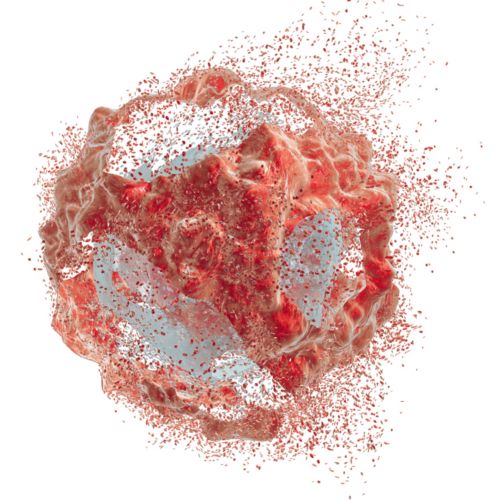Tumor lysis syndrome prevention and management
Steps can be taken to help prevent tumor lysis syndrome and treat metabolic imbalances if they occur. IV hydration and medication are used as preventive treatments for children identified to be at high risk. For some patients, less intensive chemotherapy may be given for a short time before starting aggressive therapy so that the tumor lysis happens more slowly. This may make it easier to manage, help the body to maintain its chemical balance, and prevent kidney damage. Management of tumor lysis syndrome includes monitoring blood tests, treating specific metabolic imbalances, and supporting kidney function.
Laboratory tests and symptom monitoring
Patients at high risk for tumor lysis syndrome should be monitored closely, especially during the first week of treatment. Prompt medical care can reduce the toxic effects on the body.
Monitoring for tumor lysis syndrome should include:
- Assessment of symptoms
- Measurement of urine input
- Laboratory tests to check potassium, phosphate, calcium, uric acid, blood urea nitrogen (BUN), creatinine, and lactate dehydrogenase
The monitoring schedule will depend on whether a patient is considered high, intermediate, or low risk.
IV fluids for hydration
IV fluids are usually started at diagnosis and continued through chemotherapy. Adequate hydration is important to prevent chemical imbalances in the blood and to support kidney function. Patients who have low urine output will be monitored closely. Some patients may need medicines to help urination (diuretics) or even dialysis to help filter the blood until the kidney can recover.
Medications to decrease uric acid
Medicines used to treat high uric acid (hyperuricemia) in tumor lysis syndrome in children include allopurinol and rasburicase.
Allopurinol prevents the formation of uric acid. Patients usually take allopurinol 2-3 days before the start of chemotherapy and continue taking it for 10-14 days. It is mainly used as a preventive medicine.
Rasburicase acts to break down and lower uric acid in the blood. It is fast acting, and usually works within 4 hours. Rasburicase can be used to prevent or treat high uric acid. However, patients with a G6PD deficiency should not take this medicine. Rasburicase is also a more costly treatment compared to allopurinol and is not available everywhere.
Medications to decrease phosphate
Medicines may be given to lower phosphate levels in the blood. These drugs, called phosphate binders, attach to phosphate to prevent it from being absorbed in the digestive system. Examples of these medicines include lanthanum and aluminum hydroxide (Amphojel®).
Treating electrolyte imbalances
Metabolic imbalances (high potassium, high phosphates, and low calcium) can often be treated by supporting kidney function. However, these imbalances can be an immediate risk for patients and may need specific treatments. Maintaining adequate hydration is very important. Certain electrolyte supplements should be removed from IV fluids during management of tumor lysis syndrome.
Kidney dialysis
Kidney damage is a common complication of tumor lysis syndrome. High uric acid can cause crystals to form in the renal tubules, small areas of the kidney that help to filter the blood. Every step is taken to protect the kidney including hydration, the use of diuretics, and preventive therapy with allopurinol or rasburicase. However, even with adequate medical care, the kidneys may stop working properly. Patients may need dialysis to filter the blood until the kidneys heal. For most patients, kidney function will get better slowly over time. However, some patients may have lasting kidney damage after tumor lysis syndrome, even with preventive measures.
Tumor lysis syndrome is rare. However, it can cause serious health problems. At-risk patients are monitored closely so that metabolic imbalances can be treated. It is important to follow instructions for fluid intake, diet, and medications. Your doctor can help you understand tumor lysis syndrome and know whether your child is at risk. Always talk to your care team about any health concerns, and report changes in symptoms that occur during or after treatment.

